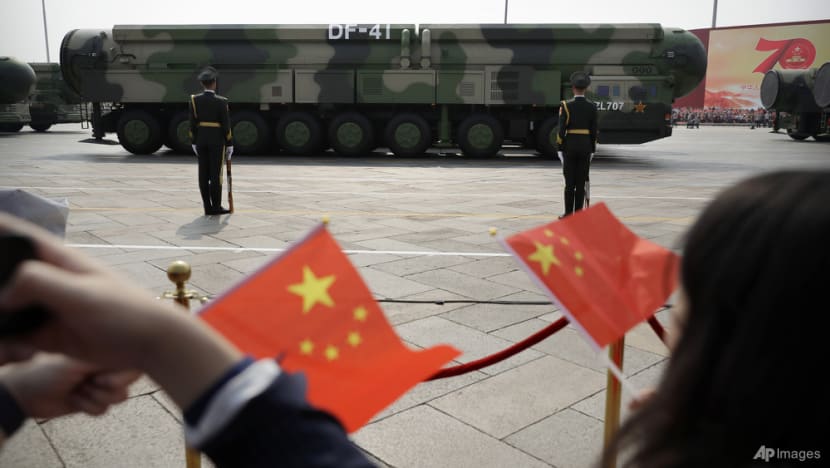China’s expanding nuclear arsenal to preempt ‘hostile activities’ in region: Analyst
China will likely have a stockpile of 1,500 nuclear warheads by 2035 if it continues with its current nuclear buildup pace, according to a report by the Pentagon.

SINGAPORE: Concerned with various alliances forming in its backyard, China may take on a more offensive nuclear posture, said a defence analyst on Wednesday (Nov 30).
Beijing “has to adopt a more offensive stance with regards to the use of its nuclear weapons”, as the geostrategic environment around China continues to change dramatically, said Mr Ridzwan Rahmat, principal defence analyst at defence intelligence company Janes.
According to a report out of the United States, China will likely have a stockpile of 1,500 nuclear warheads by 2035 if it continues with its current nuclear buildup pace.
The figures released by the Pentagon on Tuesday underscore mounting concerns over China's intentions for its expanding nuclear arsenal, with a US official stating that the Asian superpower has a rapid buildup too substantial to keep under wraps.
China is worried about the type of alliances that are currently forming in its backyard, Mr Ridzwan told CNA’s Asia Now.
This includes the AUKUS trilateral security pact between Australia, Britain and the US, which facilitates cooperation on security issues in the Indo-Pacific.
It will equip Australia with nuclear-powered submarines, which China views as a hostile move and has repeatedly criticised as an act of nuclear proliferation.
BEIJING’S SHIFTING NUCLEAR POSTURE
“I think the Chinese nuclear programme has evolved, from a point where it was purely a defensive weapon to a point where it's now being postured as a weapon to preempt any hostile activities surrounding that particular region,” said Mr Ridzwan.
When its nuclear programme started more than 50 years ago, the preoccupation in China's strategic calculations was the reunification with Taiwan and to ensure that its territorial sovereignty was not violated, he said.
“The nuclear weapon was viewed, at that point of time, as something that might guarantee its survival.”
However, the dynamics have since shifted, with observers calling China's rapid military buildup as a strategic breakout from its minimum deterrence nuclear posture.
The Pentagon’s latest annual report on China's military said the country currently has a nuclear stockpile of more than 400 warheads.
The estimate for 2035 was based on an unchanged pace of military buildup, a US official said after the report was released.
CHINA TO BOOST ITS STRATEGIC DETERRENT
China had said that its arsenal is dwarfed by those of the US and Russia, and that it is ready for dialogue, but only if Washington reduces its nuclear stockpile to China's level.
During the Communist Party Congress in October, Chinese President Xi Jinping noted that China would boost its strategic deterrent, a term typically used to describe nuclear weapons.
The Pentagon’s report reiterated concerns about mounting pressure by Beijing on Taiwan, but Washington does not see an invasion of the island as imminent.
Mr Ridzwan believes any reunification attempts with Taiwan will “probably be carried out by conventional forces rather than nuclear forces”.
“While the Taiwan Strait crisis itself is the catalyst for China's nuclear programme, I don't think it will be the tool that China will deploy in the event that it needs to reunify with Taiwan by force,” he added.
Meanwhile, South Korean President Yoon Suk-yeol said earlier this week that China has what it takes to dissuade North Korea from pursuing its nuclear ambitions.
However, Mr Ridzwan does not believe there is any interest for Beijing to curtail Pyongyang’s nuclear programme.
He added that North Korea's preparations for resuming the testing of nuclear weapons is going to complicate deterrence calculations for the US.
“And from China's point of view, any complications to the Americans will be in Beijing's favour, given how Beijing is very concerned about the security roadblocks that have formed around its territorial areas,” he added.














